Del Mar Nation
Brokeback Mountain is starting to spread out (it went into 69 theatres on Friday), and that means that sooner or later those gay cowboy jokes on “Late Night with David Letterman” and in Aaron McGruder’s “Boondocks” comic strip will be coming to an end.
The more people see Brokeback, the greater the likelihood that a certain percen- tage will start to understand that gay cowboys and high-altitude pokin’ in the pup tent ain’t the point. It’s a way into the film’s real subject, which is the terrible price of letting a good thing go.
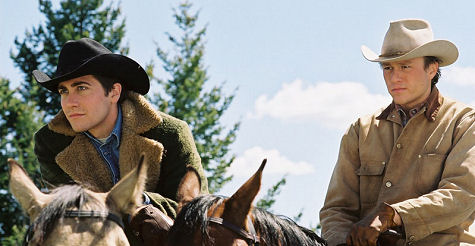
Jake Gyllenhaal, Heath Ledger in Ang Lee’s Brokeback Mountain
I mean the tragedy of a person feeling love or passion for something (a relationship, a career ambition, a creative dream) and not doing anything about it. If this movie sinks in like it’s meant to, it’ll hit you on the way home that turning away from a good and spiritually nourishing pursuit in whatever form is the saddest ride in the world.
The most tragic of Brokeback‘s frustrated cowboy lovers is Heath Ledger’s Ennis del Mar because he’s the most heavily invested in denial and pushin’ it all down. I’ve known a lot of people in a lot of cities and towns, and there are tens of thousands of Ennis del Mars out there…guys holdin’ down jobs, mindin’ the kids, pluggin’ along and not diggin’ into that special place.
< ?php include ('/home/hollyw9/public_html/wired'); ?>
And doin’ some heavy deep-down witherin’. Everyone has a secret unfulfilled dream but how many step up and try to really grab it? Damn few.
I would submit, in fact, that Ennis del Mar-ism is the hurtin’-est American tragedy of all. As spiritual killers go, it’s worse than poverty or bad luck or divorce or depression or whatever substance addiction you can name.
Getting stuck in one of these issues needn’t be more than a temporary sidetrack thing…waist-deep quicksand…but failing to embrace that One Big Thing in your life is terrible permanent rain.
I’ve been there myself. I was almost Ennis del Mar before I got going in journalism in the late ’70s. Every now and then I feel like him in an emotional sense… shut down, doin’ the work, keepin’ it together so I can wake up the next day and do the same thing.
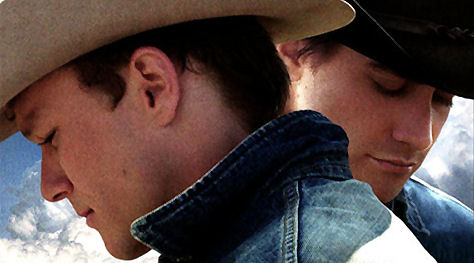
I’ve known lots of late-30ish and 40ish guys in smallish towns in Connecticut, Massachucetts, New Jersey and northern California who fit the Ennis mode more fully than myself….way.
A guy I know says he doesn’t relate to del Mar-ism because he doesn’t feel put-upon by life. He futher believes that most of the Academy members are the same.
To get into the Motion Picture Academy you have to be a go-getter, and these people won’t relate to the sadness of a uneducated loser who lacks the gumption to stand up and try to cure what’s ailing him. I don’t think Academy people are anywhere near that shallow, but he could be right.
It might also be that straight American males everywhere along with their wives will blow off Brokeback Mountain and never even consider that it’s much more about them more than a couple of cowpoke queers. It would be a shame if that happened, but it might.
I’d like to hear some thoughts about this, and if any good ones come in I promise to actually run them.
Slash Girls
“Just a comment about straight men and their wives not going to Brokeback Mountain. Jeffrey, their wives will be going with the other wives. The straight husbands can stay home, hon.
“I’m constantly amazed by the perception of many men, straight and gay, that women ‘won’t be attracted to guy/guy action.’ Do these guys ever get out and ask women about this? Roger Ebert said it the other night on some show, and Roeper agreed. Women just ‘don’t get off on guys kissing.’
“Well, hello…wrong. So so wrong. We just love it. Can’t get enough. Not all of us to be sure, but sufficient numbers for there to be thousands of websites dedicated to the phenomen called ‘slash.’ Mostly derived from television shows and films, but many other fan fics and genuine gay romances.
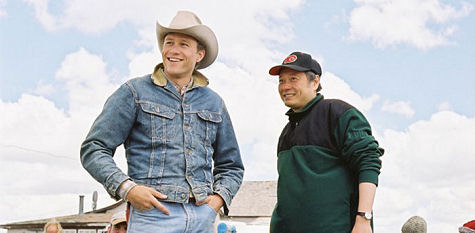
Heath Ledger, director Ang Lee during Brokeback Mountain shoot
“This is our movie…the slash movie we women have been waiting for forever. We own this film just as much as the gay guys, which makes for some fascinating territorial stakeouts and debates at times on the boards. But we generally enjoy the debates cuz we’re all really on the same side here.
“And we’re gonna be there in droves. Some of us will see it 10 or 20 times. It’s hot. That idiot publicist who said Jake Gyllenhaal’s career would be down the tubes because his teen fanbase would disown him should get a new job. His fanbase will multiply tenfold among women with this film.
“Women write about guy/guy action, guy/guy romance, and they buy gay porn and go to gay movies. And most of the women are straight, married (happily) and thirty to seventy.
“Do you know? Have you heard about this? If so, perhaps you might include it in a later column to just enlighten those poor guys who don’t know what their women are secretly fantasizing about.
“I’m from Australia by the way and will see Brokeback Mountain in a month with some girlfriends. My husband won’t go near it.” — Mandy Bartels, Melbourne.
“Later” Factor
“I still think the main reason behind Kong‘s good-but-not- great opening is the running time. And it’s not just because it has fewer shows per day.
“Of all the big critics, I think Richard Roeper is the first one I’ve heard to finally get it. Going to the movies is becoming an ordeal. Rude crowds, too many ads, ticket and concession prices through the roof, etc. Now tack on the fact that Kong is over three hours.
“What normal person (i.e. non-movie critic) can take that much time off on a weeknight, or during a busy holiday weekend? Throw in the walk from the parking lot (which in the big entertainment complexes like Universal can take 15 minutes) and the ads/trailers and you’re literally killing half a day.
“I know the Harry Potter and Rings flicks ran long, but they had a built-in audience that came aboard before the ‘big chill.’ Any new movie running more than 2 1/2 hours had better be pretty damn special. And the must-see factor for Kong, at least around here, just isn’t there.
“It’s basically seen as a bunch of critical darlings and B-list stars in a remake of a movie everyone has seen featuring a lot of been-there-done-that Lost World special effects. Of course, we know it rises above that level, but it’s going to be a chore to get people out to realize it.
“Kong will make back its money, but only after everyone buys it on DVD to play on the home theater system they got for Christmas. Then folks can play it at their leisure, maybe an hour at a time, where they can fast-forward through the ads and not have to listen to someone chatting on her cell phone.” — Rich Swank
Kong vs. Females
“A reader suggested that King Kong‘s less-than-stellar business so far is due in part to ‘average female moviegoers being too shallow to be brought into the theater without a pretty face.’
“I think that statement is a little shallow. I probably won’t see Kong this weekend for a bunch of reasons, none of which has to do with pretty or unpretty faces.
“One, I’ve already seen this movie. I know, I know…it’s been reconfigured masterfully for a new age and audience. But what made that first movie so cool was that first shock when the soon-to-be-sacrificed Faye realizes exactly what she is being sacrificed to. When Kong turns the corner and comes into view…wow! And Kong climbing up the tallest building in the world to make his last stand? Also very cool. But alas, in 2005…been there, done that.
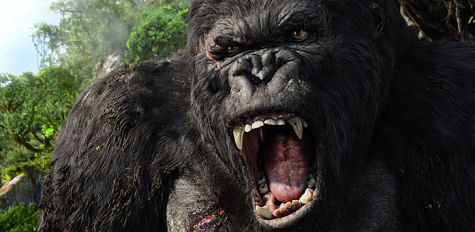
“Two, I’ve seen enough in the way of dinosaur chases and predatory behavior in Jurassic Park and its lame sequels to last a lifetime. And throwing Kong in as an adversary will not, I think, make them more interesting (a view that seems to be shared by a good number of critics who point out that the CG fights in this new film go on way too long).
“Three, and the biggest reason: I just don’t like non-verbal romances regardless of what the faces of the leads look like. Give me that artful banter back and forth between the leads in a romantic comecy or the heartfelt linguistic nuances of separation and loss in a weeper. Soulful glances can only go so far and this ape has never been much for conversation.
“Intelligent, heartfelt conversation between two people gets me every time. (You know, like that terrific conversation on wine and grape- growing in Sideways between Madsen and Giamatti, that guy who pulled in the female contingent with his pretty face.)” — Zoey
…And This Brooks Guy
“I went to see King Kong this afternoon and I have to say that for me this movie just did not work. I enjoyed the Lord of the Rings films, although I’m not a huge fan, and was looking forward to Kong but this thing is at least 45 minutes too long. The beginning dragged on forever. I think that is what is going to hurt the film the most.
“By the time you get to the island you just don’t care that much. The effects for the most part are great, Kong was especially well done, but a little restraint would have made this a much better film.
“Why do directors, once they have some success, think that every scene and every shot is pure gold? I have the same complaint about Spielberg. He needs someone to trim his movies down a bit. They’re always about 20 minutes longer than necessary.
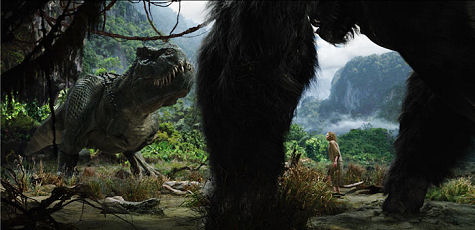
“I actually watched the original Kong a few weeks ago on Turner Classic Movies, and in some ways I prefer the original. They knew what type of movie they were making. They didn’t inflate it to something it’s not.
“The thing I resented most about Jackson’s remake what that he tried so hard to make you cry. I took my wife, who cries at the drop of hat for any movie, and she didn’t shed a tear.
“I could feel the audience growing restless as the picture went on. If you go to enough movies you can tell when people are not getting into a film. I don’t think it’s going to get the repeat business Universal hopes that it will. By the end I was sitting waiting for Kong to die just so I could out of the theater.” — Steven Brooks
World Class
Much of Terrence Malick’s The New World (New Line, 12.25) is masterful, and I’m not just blah-blahing. It’s sensually mesmerizing and caressed with my idea of real genius. It is also, commercially speaking, a kind of kamikaze film, in part because of a certain call made by Malick regarding the love-story plotline.
Ten days away from its Christmas Day opening and if I know anything, The New World is fixin’ to die. Plus there’s no critics-group awards to sustain interest among the cinefiles or any hope of above-the-line Oscar nominations in January. But forget all of this because The New World should absolutely be seen.
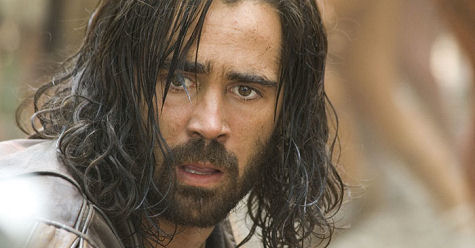
Colin Farrell in Terence Malick’s in The New World
It’s the kind of half-great movie that is more than worth the ride because of it has so many wondrous elements. The photography and textures and aromas are nearly all, and for a while they’re nearly enough. The New World may leave you feeling betrayed, but you won’t feel undernourished.
Endings are everything, and the final third of this film (lasting roughly 40 minutes) doesn’t make it at all. Because Malick, gifted but mule stubborn, is off in his own realm, and the task of supplying a story that you and your friends might want to see isn’t worth his heavy-cat consideration.
The New World‘s drawn-out, epilogue-like final act is, in fact, an example of abrupt story betrayal and audience abandonment. It should be picked over in filmmaking classes at USC and NYU in years to come as a lesson in what a director looking to survive in the world of commercial filmmaking should never ever do.
A few weeks ago The New World producer Sarah Green told the New York Times that “first and foremost we’ve created a love story.” This is unmistakably true for the first 100 or so minutes, and in a near-revolutionary sense.
The legendary, historically fanciful saga of British explorer John Smith (Colin Farrell) and the teenaged Pocahantas (Q’orianka Kilcher) in early 1660s Virginia feels vitally alive and re-imagined as a kind of naturalist culture-clash love story… largely non-verbal, visually haunting…primal atmosphere seeping out of every frame.
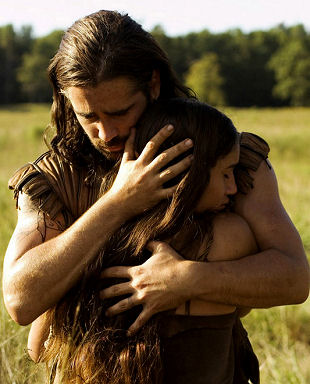
Colin Farrell, Q’oiriana Kilcher
Green also told the Times, “We’re definitely not doing a historical piece. We try to set it properly…we try to give that background and that feeling, but we focus on the love story.” As far as the last act is concerned, that’s a distortion.
The Farrell-Kilcher love story is totally abandoned (and in a very brusque and alienating way at that) and the film pretty much sticks to the historically accepted story of Pocahantas’ life for the last third — marriage to a wealthy English tobacco grower named John Rolfe (Christian Bale), bearing a child, travelling to England to meet the King and Queen, and an early death.
The failure of The New World ending is entirely due to the fact that this final section plays like a postscript. But for those first two thirds, The New World is a truly rare animal and movie like no other…a feast of intuitive wow-level naturalism that feels as fresh and vitally alive as newly-sprouted flora.
This is the forest primeval, all right…the native Americans (“naturals”) and English settlers eyeballing each other amid the mumuring pines and hemlocks, and then prodding, spearing, shooting and finally accepting each other in a step-by-step evolving cultural passion play.
I’ve respected Terrence Malick as a genius all of my filmgoing life. I knew that before but I was reminded once again when I sat down with this film in late November. And I’m truly glad to live in a world that gives up a Malick film every five or six years.
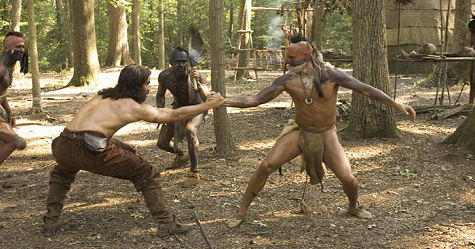
But he’s so imbedded in his own head that he can’t deliver a halfway satisfying commercial movie. I don’t mean formulaic. I mean a film that simply satisfies like his two best films, Badlands and Days of Heaven, did 32 and 27 years ago, respectively.
I was going to say Malick is a “compositional” genius rather than an overall genius, but I have to repeat that the first 100 minutes of The New World were, for me, truly exquisite. Exquisite in the way that profound visual art always is.
The film is heart-stoppingly beautiful at times. The acting is all about eyes and faces and initmations…hardly anyone says anything, and most of the dialogue arrives in the form of internal narration.
The only person who speaks from the diaphragm in complete sentences with any clarity is costar Christopher Plummer. Everyone else and every plot turn is conveyed in mutters, whispers and meditative voice-overs. You get what’s happening bit by bit but Malick refuses to spell anything out in Hollywood connect-the-dots terms.
The feeling of primal aliveness in this film is a real pore-opener. Call it an aura of naturalism — a feeling that you’re really and truly there with the moisture and the mud on your feet…the grime and hard work and smell of the leaves and the soil….the worshipping of nature’s magnificence and terror. It really and truly is Virginia in the 1600s coming off the screen and sinking into your eco-system.
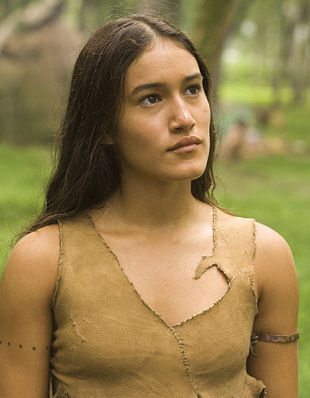
Q’orianka Kilcher
There’s a truly wondrous sequence about Farrell having been accepted into Pocahantas’s tribe and taking part in their rituals. And there’s a truly amazing battle scene in which you don’t see the big picture, but how it is to be right in the middle of it. Extraordinary isn’t the word.
There’s no Hollywood crap in any of it. This is a kind of filmmaking you’re just not going to get from anyone in the mainstream realm. I wasn’t just impressed with the first 100 minutes or so. I was close to levitating at times.
James Horner’s fugue-like music is startling — a kind of a droning thing with one or two notes played continuously, like some kind of foghorn symphony.
Emmanuel Lubezki’s cinematography, Jack Fisk’s art direction, the set decoration by Jim Erickson (those ships!) and costumes by Jacqueline West, and the sometimes mind-spinning editing by Richard Chew, Hank Corwin, Sara Klein and Mark Yoshikawa…what a magnificent thing to sink into.
And then about 100 minutes in, Malick drops the bomb, pulls the rug out and leaves you emotionally stranded without a love story to hang onto. But before I explain…
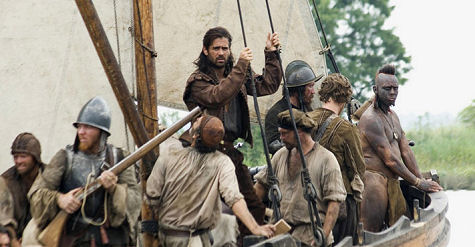
Spoiler Alert!
Farrell’s Smith decides that he and Kilcher are doomed because their cultures are so at odds and her association with him will only cause her harm. So he does the hard thing and blows her off.
Love stories, of course, are about overcoming odds,but there’s no such effort here, much less an effort on Malick’s part to clearly explain Smith’s thinking. The way it plays is that Farrell does a cold and shitty thing by abandoning Kilcher for the sake of career opportunism, since he’s been offered an assignment to explore the northeast territories.
And Farrell doesn’t even break the news to her straight, like a man of some marginal tenderness or compassion (which is how he’s been portrayed up to this point) might do. He doesn’t even say, “Sorry, gotta move on”…which would have been bad enough. Farrell just bails, but before doing so gets Noah Taylor (the Shine and Almost Famous guy) to tell her after a couple of months that he’s drowned.
I liked Farrell up to that point and really invested in the thing he and Kilcher had together, but blowing her off like that and skipping out the back door is unconscionable. I turned on him and the movie at that point. I said to myself, “Did that just happen?”
So Malick carefully builds the love story, weaving it into the whole, and then he pulls the rug out and shifts gears in order to tell the historically true tale about Pocahantas marrying and having the kid and going to England and all.
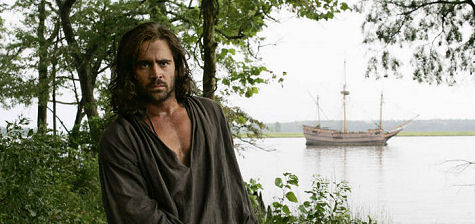
This is a shitty development to throw into a movie that gives every indication (on top of Sarah Green’s earnest statements to the New York Times) it’s primarily about the Colin-and-Q’orianka love story…which the poster in the lobby obviously declares.
Am I saying I want to see the animated Disney Pocahantas all over again but with Malick-y textures and mood and photography and real actors? No. I want a third option of some kind.
I wanted a little Days of Heaven thrown in, perhaps. When Christian Bale came along, I said to myself (and another person who was at the screening told me they had the same reaction), “Oh, I get it…Bale is Sam Shepard in Days of Heaven. And Farrell is going to come back and somehow redeem himself in her eyes and Bale or Farrell will have a showdown and maybe one of them will die.”
But that’s not it. And how could Farrell redeem himself anyway? A tough thing, given what he’s done to Kilcher, particularly the way he’s done it.
I felt profoundly invested in Farrell and Kilcher, dammit, and since part of me is a 17 year-old girl munching popcorn, it felt seriously, criminally wrong to throw their love story out like the garbage.
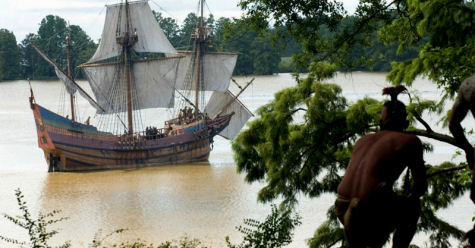
Malick does a wonderful job of making me care about these two because he does it so unusually and with such feeling, not just in the two of them but their merging within his nature suite….and then he simply stops caring about them.
Blanche Dubois said it: deliberate cruelty is not forgivable. And Farrell breaking that poor teenage girl’s heart is that.
If you were sitting around a campfire and somebody told you the story of The New World, you’d probably say, “That’s a love story? It’s not even a good story. It starts one way and then goes another way and doesn’t pay off.”
Which is kind of what someone in the lobby after the screening that I attended: “Yeah….what was that?”
An industry friend says it’s the kind of film in which “you come out humming the sets.” His first reaction last night was, “Malick doesn’t know how to tell a story. He’s totally stuck on himself and he’s living in his own realm.”
I said to a friend right after seeing it, “This is the kind of movie made by a guy who’s spent way too much time in his his oak-panelled library, reading books and smoking a pipe and looking out upon the grounds at sunset.”
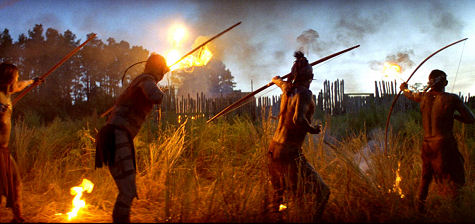
That friend told me I’m missing the point and the film is actually about assimilation. Okay, I can see that. And I can just imagine the over-25s, couples and upscales coming out of the theatre and saying, “That was one great movie about cultural assimilation!”
So Terrence Malick is a genius, but a genius who needs a like-minded but tough and practical producer who can stand up to him and talk back when it’s appropriate and call his creative bluff when push comes to shove…and he didn’t have that here.
Read again the story about how Bert and Harold Schneider made him trim Days of Heaven from a three-hour or two-and-a-half-hour cut to 97 minutes, which is how long that beautiful film lasts.
Even Mike Medavoy, who’s known Malick for decades, couldn’t wrestle Terry to the ground and make him trim The Thin Red Line into a tighter, less meditative thing. (The script was much leaner thanj the film…the emphasis that the film had on alligators, leaves and trees and all that meditative “who are we and why do we create such havoc in our lives?” narration crap wasn’t there…I read it and I know.)
And if Medavoy couldn’t get to Malick, you know Sarah Green couldn’t. It’s pretty clear that The New World wasn’t made with any ideas of regular-Joe audiences finding their way into it. It’s about Malick’s vision and nothing much beyond that. That’s the wonder and frustration of it.
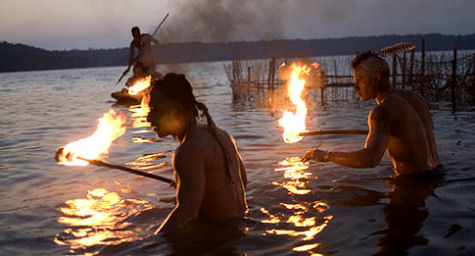
Best and Worst of `05
I can’t do a Ten Best of ’05 of list — the number has to be fourteen. And I had to include 28 films on the “Pretty Damn Good” roster, and I had to make a special mention of Terrence Malick’s stunningly see-worthy shortfaller, The New World.
That’s a total of 43 very good-to-sublime films released this year, or a little less than one every nine days. Not a bad tally, and arguably one of the more distin- guished in recent years, and with the makings of a rip-snortin’ Oscar fight in January and February.

Heath Ledger, Jake Gyllenhaal in Ang Lee’s Brokeback Mountain
Just do the fast-rewind for a second…the finely-tuned austerity of A History of Violence and Match Point, the note-perfect Capote, the spookiness of Cache, the sad and tremulous Brokeback Mountain, the familial warmth of films like Hustle & Flow, In Her Shoes and The Family Stone, the Van Santian purity of Last Days, the bleached-bleary paranoia of Syriana, the Lawrence of Arabia-like sweep of Bob Dylan: No Direction Home…and that’s just scratching it.
I’ve kept the docs separate except for Werner Herzog’s Grizzly Man, which gets spookier and spookier the more I watch it and fully deserves its own space, and Martin Scorsese’s masterful Bob Dylan: No Direction Home. Some films (like Cameron Crowe’s Elizabethtown ) were special cases and required a stand-alone mention. And of course, nearly all the super-stinkos were expensive big- studio releases.
I’ve only listed 102 films so I’ve obviously left a lot out. There are plenty I still haven’t seen. And some just don’t matter. I couldn’t think of a single thing to say, good or bad, about Thomas Vinterberg’s Dear Wendy or John Stockwell’s Into the Blue, for example.
The listings in each category are in order of personal preference. Suggestions about films I’ve omitted and should have added to this or that category are welcome. I’m sure there are several.
Creme de la Creme: Brokeback Mountain, Capote, The Constant Gardener, A History of Violence, Hustle & Flow, In Her Shoes, Match Point, The Family Stone, Crash, Cinderella Man, The Beautiful Country, Last Days, Grizzly Man, The Three Burials of Melquiades Estrada (14).
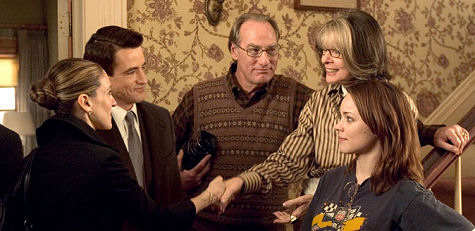
Early scene in Thomas Bezucha’s The Family Stone
70% Masterful…Merging of Lovers From Different Cultures in the Midst of a Splendorous Natural Symphony…But Goes off The Rails, Drop-Kicks the Mood and Leaves You Stranded at the 110-Minute Mark : The New World (1)
Pretty Damn Good: Good Night and Good Luck, The Wedding Crashers, Syriana, The Aristocrats, Batman Begins, Broken Flowers, Bob Dylan: No Direction Home, Cache (Hidden), The Interpreter (for the bomb-on-the-bus scene alone), King Kong (if you can excuse the first 70 minutes), Nine Lives (for Robin Wright Penn alone), Cronicas, The Beat That My Heart Skipped, The Squid and the Whale (Noah Baumbach has an assured place at the table), The Upside of Anger (for Kevin Costner’s performance) , The Thing About My Folks (for Peter Falk’s performance), Mrs. Henderson Presents, Kung Fu Hustle, Kingdom of Heaven, Rent, Broken Flowers, Brothers (for Connie Nielsen’s performance and the austere and upfront tone of Suzanne Bier’s direction), The Chronicles of Narnia: The Lion, The Witch and The Wardrobe, War of the Worlds, Casanova, My Date With Drew (a good-humored rendering of a metaphor about youthful pluck and persistence and team spirit), My Summer of Love, Paradise Now. (26)
Not Half Bad: The Producers, The Dying Gaul, The World’s Fastest Indian, Four Brothers, Layer Cake, The Great Raid, Reel Paradise, Green Street Hooligans, Everything is Illuminated, Proof, Dreamer: Inspired by a True Story, Tim Burton’s Corpse Bride, Dominion: Prequel to The Exorcist (13)
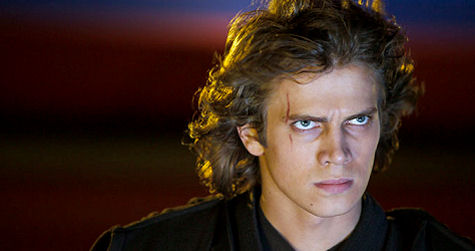
Hayden Christensen’s tormented Annakin Skywalker
Unquestionable Failure That Nonetheless Half-Saves Itself as It Comes to a Close: Elizabethtown (1)
Biggest Bummer (and splattered milkshakes don’t matter): The Weather Man (1)
Solid First Stab by Talented Director: Scott Caan’s Dallas 362 . (1)
Grudging Approval (i.e., respect for an obviously first-rate film that I didn’t partic- ularly enjoy watching all that much): Wong Kar Wai’s 2046 (1)
Blaaah: Kiss Kiss Bang Bang, North Country, Shopgirl, Jarhead, The Libertine (5)
Tediously Acceptable: The 40 Year-Old Virgin (Catherine Keener’s fine perform- ance helped); March of the Penguins. (2)
Crap Marginally Redeemed By…: Sin City (heavenly Nevada silver-mine black- and-white photography); House of Wax (Paris Hilton’s death and some fairly inventive pizazz shown by director Jaume Collet-Serra. (2)
Cavalcade of Crap…Moneyed, Honeyed, Sullied…an Affront to The Once Semi-Respectable Tradition of Mainstream Hollywood Filmmaking: The Dukes of Hazzard, The Island, Bewitched, Rumor Has it, Deuce Bigalow: Euro- pean Gigolo, Must Love Dogs, Memoirs of a Geisha, Domino, The Legend of Zorro, Mr. and Mrs. Smith, Constantine, Aeon Flux, Fantastic Four, Charlie and the Chocolate Factory, Miss Congeniality 2: Armed and Fabulous . (15)
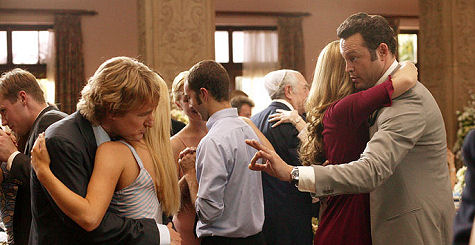
Owen Wilson, Vince Vaughn in The Wedding Crashers
Final Enduring Proof of George Lucas’s Mediocre Soul : Star Wars: Episode III — Revenge of the Sith (1)
Best Docs (after Grizzly Man and Bob Dylan: No Directon Home): Why We Fight, Gunner Palace, Mondovino, Favela Rising, Enron: The Smartest Guys in the Room, Mad Hot Ballroom, Tell Them Who You Are, One Bright Shining Moment: The Forgotten Summer of George McGovern (for the tribute factor alone…McGovern is such a respectable man), Rize, The Last Mogul, Murderball, Occupation: Dreamland (12)
Never Saw’ Em: Ballet Russes (apologies to the hard-working Mickey Cottrell and the all-around good guy producer Jonathan Dana, who repped it), The Ice Harvest, Oliver Twist, Little Manhattan, Transamerica, The Prizewinner of Defiance, Ohio, Forty Shades of Blue, Get Rich or Die Tryin’, You and Me and Everyone We Know (9)
Favorite DVDs of the Year: Two Criterion special editions — Michelangelo Antonioni’s L’eclisse and Robert Bresson’s Au Hasard Balthazar.
Worst DVD of the Year: Fox Home Video’s two-disc Oklahoma! because of the appallingly bad mastering of the Todd AO verison of the film, which looks worse than any version of this film ever put out, including the VHS versions in the ’80s. I said before that the executive who approved this should be fired. I was wrong to say this. He should be hung by his thumbs.

Jon Cusack, Diane Lane in Must Love Dogs
Thick as Thieves
Once again reactions to Werner Herzog’s Grizzly Man have people shaking their heads and asking “what the hell?” And once again there’s reason to ask why the members of the Motion Picture Academy’s Documentary Executive Committee continue to hold to a tendency to make total boob-level decisions.
Knowledgable people everywhere were appalled when Herzog’s brilliant examina- tion of the life of Timothy Treadwell, a self-promoting grizzly bear obsessive who wound up getting eaten by one, didn’t make the committee’s short list of doc fin- alists, which was announced on 11.15.05.
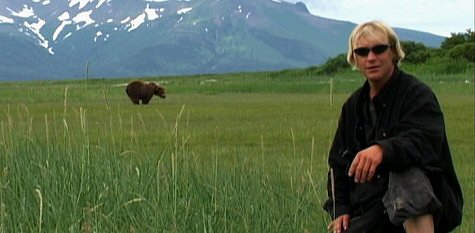
The late Timothy Treadwell as presented in Werner Herzog’s Grizzly Man
And now the committee’s oversight is being examined once again in the wake of Grizzly Man having been named the year’s best feature-length documentary by four respected critics groups — the New York Film Critics Circle, the Los Angel- es Film Critics, the New York Online Film Critics and the San Francisco Film Critics — over the last four days.
The doc committee, chaired this year by Freda Mock, of course isn’t obliged to agree with film critics groups in its choice of the year’s finest. But with four different groups of obviously passionate film lovers picking Grizzly Man, wouldn’t you think the AMPAS committee would have at least included it on the preliminary list of finalists?
Obviously there’s a major disconnect going on here.
I called around about this and all I hear are the usual throwaway comments. A publicist who asked for anonymity said the documentary committee is “a curious bunch.” A nameless documentary filmmaker I spoke to said, “You never know about these people.”
It’s been suggested here and there that Grizzly Man didn’t rate in the committee’s eyes because it’s composed of mostly found video footage — i.e., Treadwell’s — or because Herzog edited the film for a relatively short period of time. Whatever.
I called an Academy spokesperson this afternoon for some sort of explanation or comment about this disparity of opinion. She declined.
Lion’s Gate Home Entertainment will be releasing a DVD of Grizzly Man on DVD on Tuesday, 12.26.
Words for Kevin
I’m not sure if people are getting how reborn Kevin Costner is these days. I don’t know him and I’m not claiming any special insight, but over the last two or three years Costner seems to have remade himself into this quietly self-amused older guy who just ambles along and instinctually gets everything and could almost be Bruno Ganz in Wings of Desire.
People who try really hard to please are exhausting. (Case in point: Sarah Jessica Parker’s bitch from Bedford in The Family Stone.) Costner is pleasing these days because he doesn’t seem to trying at all, and because not trying is a very clever play.
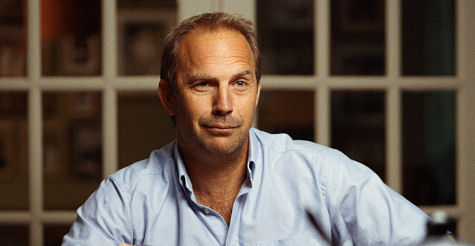
Kevin Costner in The Upside of Anger
I’m not talking about Open Range (2003), which was his first big career-turnaround film. I’m talking about how Costner seemed to become this other guy when he put on the jacket of a supporting actor in Mike Binder’s The Upside of Anger, and the way he’s done it again in Rob Reiner’s Rumor Has It (Warner Bros., 12.25).
Rumor is what it is, but at least Costner makes his scenes play pretty well on their own. The ability to make tepid dialogue sound fairly good is something to respect, I think. This is partly due to the fact that there’s no middle-aged actor around these days who seems quite as settled into himself.
I remember reading in some weekly mag puff piece about 15 years ago that Cost- ner doesn’t work out, and thinking this was kind of a funny attitude. Now I get it. Costner is Mr. Anglo-Dangle Bojangles…the laid-back guy in loose shoes who can charm without trying but just as easily let the whole thing go if the vibe’s not right.
There’s just something zen about him now, and he couldn’t have gotten to this place if he hadn’t been Mr. Big Swinging Dick with his Oscar and the failures of Waterworld, Wyatt Earp and The Postman. He had to go down and come back from that.
In a semi-fair world, Costner would be getting talked up as a Best Supporting Actor for his Anger schmanger…like he is right here and now.









